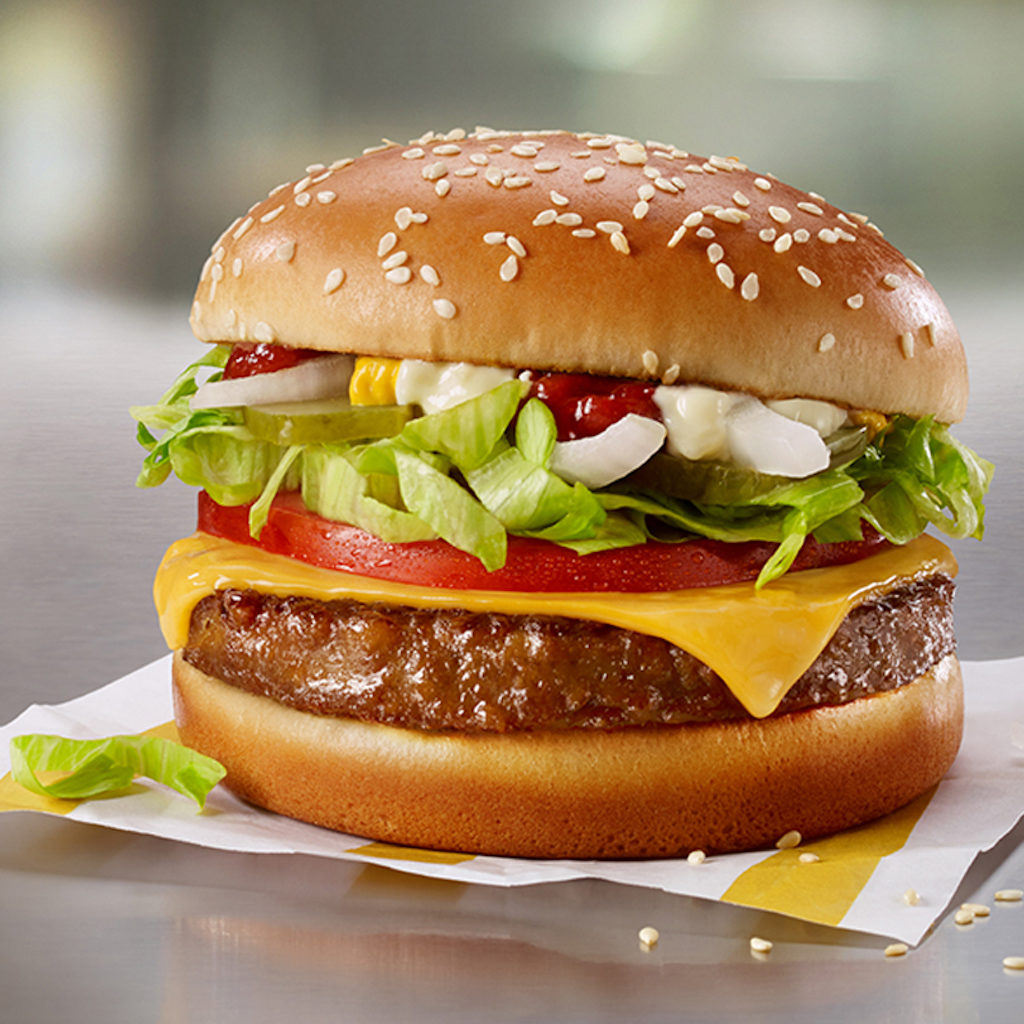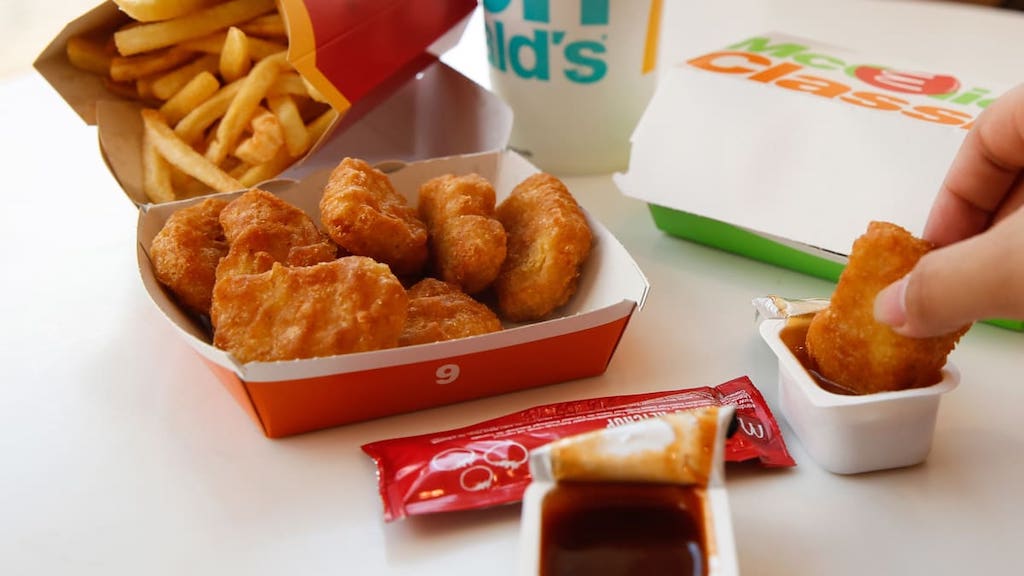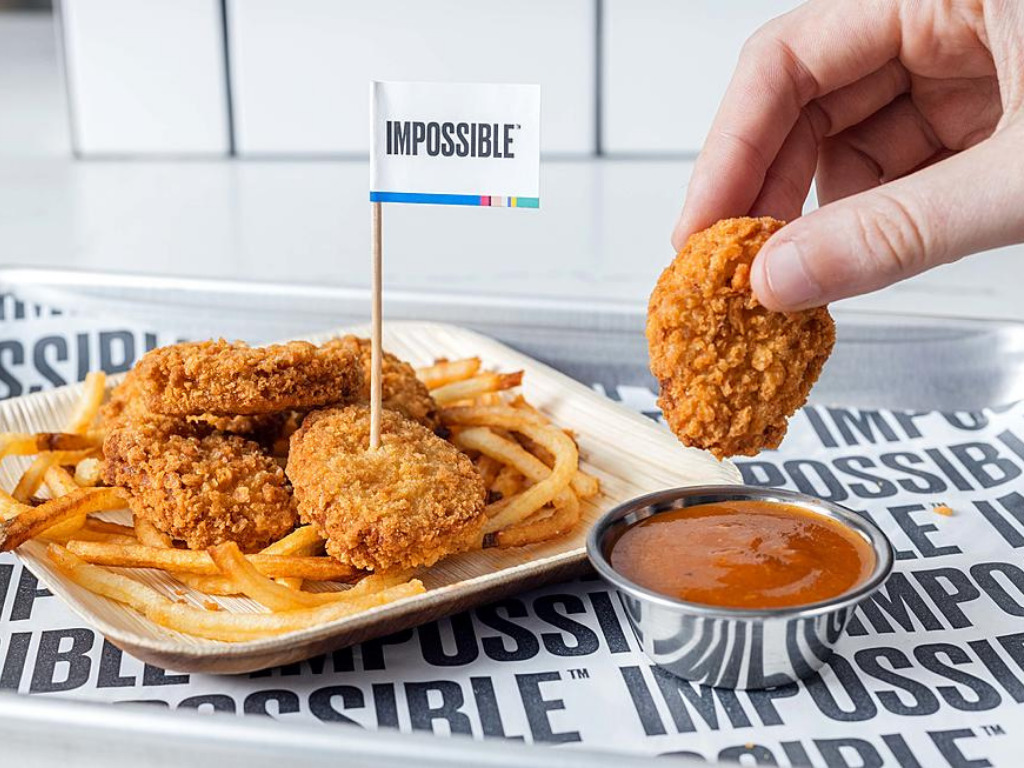Impossible Foods Does The Possible: Vegan Chicken Nuggets Out to Save the World
7 Mins Read
Your grandchildren won’t know what “real” chicken nuggets taste like. And 2021 will be the year that certainty was cemented, thanks in part to Impossible Foods and its vegan chicken nuggets.
Impossible Foods, best known for its meaty vegan burgers, has launched its version of the vegan nugget in the U.S. with a mission to fix our food system. The new Impossible nuggets launched today in the brand’s biggest U.S. debut to date: 10,000 stores, including Walmart, and more than 100 restaurants, including Michelin star chef David Chang’s Fuku.
Nicole Lee, senior editor for Endgadget tried the nuggets in San Francisco:
“They were absolutely delicious, with a crispy well-seasoned breading and a juicy, moist interior. Fresh out of the fryer, they definitely tasted better than the ‘chik’n’ nuggets from the likes of Gardein or Boca Burgers. They didn’t taste exactly like chicken either, but they were close enough that I didn’t mind. In fact, when dipped in various sauces (Gott’s serves them with ranch, ketchup and honey mustard), they were indistinguishable from the real deal”.
Impossible vegan nuggets
Compared to Tyson, the leading chicken nuggets manufacturer in the U.S., the Impossible nuggets come out near equal on nutrition—slightly lower in fat, a pinch higher in sodium, a pinch lower in protein. But unlike Tyson’s nuggets, these contain no cholesterol and four grams of fiber, which comes from its bean and wheat base.
The nuggets will net out a bit pricier than traditional chicken nuggets—about 0.30 cents per piece versus the 0.15 to 0.20 cents per conventional. But there is a caveat: one of the options is a leading contributor to climate change and zoonotic diseases, the other promises it does the opposite—without compromising on taste or texture.
“Our technology platform allows us to recreate animal products across protein categories that outperform the animal versions in every way,” Impossible Foods President Dennis Woodside said in a statement. “Poultry is the most consumed meat in the United States, and Impossible Chicken Nuggets represent an incredible opportunity to transform the industry with a more delicious and sustainable version of a classic.”

All of this, of course, as McDonald’s, Burger King, and KFC have been increasing their meatless options in a bid to provide healthier options for their core consumers, and make themselves more attractive to climate-conscious Millennials and Gen-Z. And while burgers have been an entry point there, with meatless options now at virtually every fast-food chain, nuggets represent a whole new market: children.
Nuggets are, ostensibly, food for kids. They appear on most kids’ menus, no matter what else the restaurant serves. They come in cutesy, if not slightly terrifying, dinosaur shapes—a nod to their ancestors, certainly, but also, if you’re looking deep enough, a reminder that those dinosaur bones equate to our current fossil fuel addiction, which is also fed by our other bad-for-us and bad-for-the-planet habit: eating animals. Animal agriculture is a leading contributor to climate change and transportation of those animals—whether to slaughter or the supermarket—is a big part of the problem.
A nugget alone cannot solve all of these issues. Not even a dinosaur-shaped one. The vegan kind are just as reliant on transport as the slaughtered kind, after all. But removing animals from the nugget can help us to reimagine the possibilities of our food system. And when a nugget can do that, it moves off the kids’ menu and onto the global table of the future—where meatless nuggets aren’t just the logical choice but a bona fide upgrade.
The Future of Meat
The launch comes on the heels of competitor Beyond Meat’s recent chicken tenders in the U.S. But Impossible’s chief rival here isn’t necessarily the other vegan brands (although the vegan chicken wars are indeed real). They’re all going after the giant meat market; Impossible’s founder, Patrick Brown, has said the end of meat is the company’s goal—and he gave it a 2035 deadline. Its main competitor here of course is Tyson. The one-time investor in Beyond Meat has felt the pressure for years. It launched its own range of plant-based and mixed protein products, pushing back against the meat-free competitors vying for market share.
Then, there’s McDonald’s. Where nuggets were born, where nuggets still reign supreme.
With the chain’s McPlant, it most recently gave meatless meat yet another go after several failed attempts. It’s doing it because it knows what’s coming. The vegan meat industry should hit $12 billion by 2025, still a pea in the sea of the trillion-dollar meat industry—but there’s no denying consumers are eager for cleaner protein, even the cell-based slaughter-free stuff.

The coronavirus pandemic has seen vegan food sales skyrocket. It’s not that people just decided to go vegan during lockdown. Most of them still eat meat. But what did change was the number of people all of a sudden looking to apps like Postmates and GrubHub for a bit of relief from quarantine cooking.
And with access to a whole new world of menus at their fingertips, adventurous eating filled the gap. This transition is also encouraged by some of the most revered public health and science organizations in the world. 2015 saw processed meat slapped with a cancer warning label by the World Health Organization. Climate experts continue to warn that meat-eating is beyond detrimental to our current climate crises. Sir David Attenborough has spoken broadly about this issue as one of our last, best hopes to save the planet.
Last November, a study found we cannot hit Paris Agreement targets unless we shift away from our current consumption habits. That’s even if we stop all other emissions-producing activity. It’s a stark, undeniable warning. The United Nations recently endorsed a Chatham House report that says global biodiversity loss is imminent if we don’t shift away from meat. The reasons keep coming, like fry orders at a McDonald’s drive-thru.
Eating animals
Of course, Covid lockdown adventure eating aside, the pandemic itself is linked to eating animals. And zoonotic diseases like Covid are among the leading threats to public safety. Experts warn that more severe pandemics than coronavirus could be ahead if we don’t put some plants on our plates instead of meat.
The meat industry is all too aware of the risks. Some of these were highlighted by the rapid spread of Covid infections in the close quarters of slaughter and processing lines. But there have been issues that long preceded the virus, including the rampant overuse of antibiotics.
For the meat industry, though, this all amounts to what you might call an existential crisis. Without meat, what is a meat industry? If that koan has an answer, it’s surely along the lines of Impossible Foods.

But for those that orbit just slightly outside of that giant existential black hole, like McDonald’s, these problems become opportunities a whole lot faster. McDonald’s knows this. It has been trying to figure it out for years, first in shifting from cage-free eggs, sourcing fair-trade coffee, and now, helping the world break, or at least, get real about its meat addiction with the launch of vegan options across the globe. But, like its burgers that can sit under glass for years and not decay, the truth has been hard to digest. It has tried. And it has failed.
But it’s never tried a vegan nugget. The nugget is as much a holy grail as it is fungible. Could Impossible change that? Could Beyond Meat do it? Beyond partnered with McDonald’s already on the McPlant and some of its Asian offerings. With both of the biggest vegan meat producers now in nugget territory, it seems a sure thing that by this time next year, we’ll have vegan nugget options from at least one major fast-food chain in the U.S., if not all of them.
And that’s what makes now so different, so notable from all the other attempts. Impossible Foods is doing what no other vegan brand has yet to attempt with a product launch. It’s a zone defense. It’s leveraging one of the most ubiquitous comfort foods that are easiest to replicate—because, let’s face it, a nugget tastes like the sauce you dip it in more than it tastes like a nugget. And that’s why it can’t, and won’t fail.
Impossible’s approach will allow for restaurants—fast-food chain menus, especially—to slowly, but surely, lose the meat altogether. Pull out your crystal ball if you need some reassurance. But this is what the future holds: It’s not Impossible. It’s a future that’s entirely possible after all.



